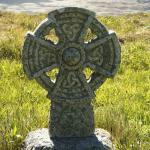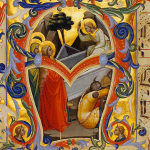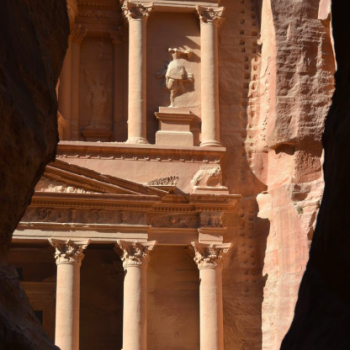Apologia Pro Blog Post Sua
As trying to annotate the long Gospel passage for Palm Sunday is far too intimidating for me, I regard myself as being now caught up to the Lectionary. Hooray!
In previous years, I’ve offered meditations for each of the days of Holy Week, from Palm Sunday to Easter Sunday inclusive. I’m busier than usual this year, and haven’t made the time to do that.
Instead, I’ve decided to take the Holy Week narrative in Mark and divide it up according to the days it suggests, to help readers get a better sense of how the time proceeded, something I find isn’t always clearly understood. My own belief—I don’t know how common it is—is that Mark’s chronology is the most accurate; Luke seems to be somewhat vague in his grouping of information, and both Matthew and John arrange a good deal of their material topically. Below the passage for each day, without making thorough notes, I’ve highlighted the material peculiar to the Gospel of Mark.
Tuesday, Thursday, and Friday are particularly lengthy (hence my atypical use of small font for the Scripture). Tuesday features most of the parables and verbal sparring with the Jerusalem authorities; Thursday through Friday include the Last Supper, the agony in Gethsemane, the arrest, the trials before the Sanhedrin and Pilate, the way of the Cross, and the Crucifixion proper. Additionally, the exact boundary between Maundy Thursday and Good Friday isn’t entirely clear. I’ve done my best to pin it to the second cock-crow, the one St. Peter had his wretched moment of self-realization at.
Cross-references (when there are any) in the other two Synoptics and John are noted, not all of which occur in order or with the same “pacing”; I’ve also explained the folk names of the individual days, and made a footnote about the discrepancies in the Resurrection appearances. Lastly, since I’m not also translating, I’ve indulged my sentiments so far as to use the King James.
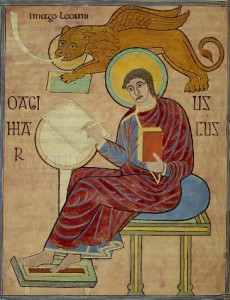
Portrait of St. Mark the Evangelist from
the Lindisfarne Gospels, an Anglo-Celtic
evangeliary from the early eighth century.
Palm Sunday
Mark 11.1-11; cf. Matthew 21.1-11, Luke 19.28-44, John 12.12-19
Named for the palm branches strewn by the crowds in Jesus’ path as he entered Jerusalem.
And when they came nigh to Jerusalem, unto Bethphage and Bethany, at the Mount of Olives, he sendeth forth two of his disciples, and saith unto them, “Go your way into the village over against you: and as soon as ye be entered into it, ye shall find a colt tied, whereon never man sat; loose him, and bring him. And if any man say unto you, ‘Why do ye this?’ say ye that the Lord hath need of him; and straightway he will send him hither.”
And they went their way, and found the colt tied by the door without in a place where two ways met; and they loose him. And certain of them that stood there said unto them, “What do ye, loosing the colt?” And they said unto them even as Jesus had commanded: and they let them go.
And they brought the colt to Jesus, and cast their garments on him; and he sat upon him. And many spread their garments in the way: and others cut down branches off the trees, and strawed them in the way. And they that went before, and they that followed, cried, saying, “Hosanna; Blessed is he that cometh in the name of the Lord: Blessed be the kingdom of our father David, that cometh in the name of the Lord: Hosanna in the highest.”
And Jesus entered into Jerusalem, and into the temple: and when he had looked round about upon all things, and now the eventide was come, he went out unto Bethany with the twelve.
Details peculiar to Mark include: that Jesus did not (as Matthew seems to imply) cleanse the Temple immediately, but went in and looked around the day before—meaning that this cleansing was, at least presumably, a planned action.
Fig Monday
Mark 11.12-19; cf. Matthew 21.12-17, Luke 19.45-46, John 2.13-22
Named for the fig tree withered by Jesus for its fruitlessness.
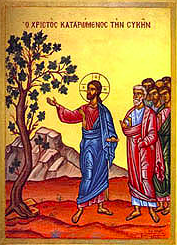
Byzantine ikon of the blasting
of the fig tree.
And on the morrow, when they were come from Bethany, he was hungry: and seeing a fig tree afar off having leaves, he came, if haply he might find any thing thereon: and when he came to it, he found nothing but leaves; for the time of figs was not yet. And Jesus answered and said unto it, “No man eat fruit of thee hereafter for ever.” And his disciples heard it.
And they come to Jerusalem: and Jesus went into the temple, and began to cast out them that sold and bought in the temple, and overthrew the tables of the moneychangers, and the seats of them that sold doves; and would not suffer that any man should carry any vessel through the temple. And he taught, saying unto them, “Is it not written, ‘My house shall be called of all nations the house of prayer’? but ye have made it ‘a den of thieves.'” And the scribes and chief priests heard it, and sought how they might destroy him: for they feared him, because all the people was astonished at his doctrine.
And when even was come, he went out of the city.
Details peculiar to Mark include: that the blasting of the fig tree and its withering (or at least the disciples noticing it had withered) took place on separate days, and the blasting took place on the same day as the cleansing of the Temple; and that Jesus “would not suffer that any man should carry any vessel through the Temple.”
Temple Tuesday
Mark 11.20-13.37 (?); cf. Matthew 21.18-26.2, Luke 19.47-21.38, John 12.20-50
Named for the teaching delivered by Christ, first in the Temple, and later about its coming destruction.
And in the morning, as they passed by, they saw the fig tree dried up from the roots. And Peter calling to remembrance saith unto him, “Master, behold, the fig tree which thou cursedst is withered away.” And Jesus answering saith unto them, “Have faith in God. For verily I say unto you, that whosoever shall say unto this mountain, ‘Be thou removed, and be thou cast into the sea’; and shall not doubt in his heart, but shall believe that those things which he saith shall come to pass; he shall have whatsoever he saith. Therefore I say unto you, what things soever ye desire, when ye pray, believe that ye receive them, and ye shall have them. And when ye stand praying, forgive, if ye have ought against any: that your Father also which is in heaven may forgive you your trespasses. But if ye do not forgive, neither will your Father which is in heaven forgive your trespasses.”
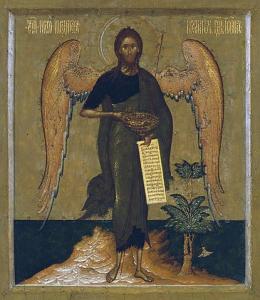
Slavic ikon of St. John the Baptist.
And they come again to Jerusalem: and as he was walking in the temple, there come to him the chief priests, and the scribes, and the elders, and say unto him, “By what authority doest thou these things? and who gave thee this authority to do these things?” And Jesus answered and said unto them, “I will also ask of you one question, and answer me, and I will tell you by what authority I do these things. The baptism of John, was it from heaven, or of men? answer me.” And they reasoned with themselves, saying, “If we shall say, ‘From heaven’; he will say, ‘Why then did ye not believe him?’ But if we shall say, ‘Of men’;” they feared the people: for all men counted John, that he was a prophet indeed. And they answered and said unto Jesus, “We cannot tell.” And Jesus answering saith unto them, “Neither do I tell you by what authority I do these things.”
And he began to speak unto them by parables. “A certain man planted a vineyard, and set an hedge about it, and digged a place for the winefat, and built a tower, and let it out to husbandmen, and went into a far country. And at the season he sent to the husbandmen a servant, that he might receive from the husbandmen of the fruit of the vineyard. And they caught him, and beat him, and sent him away empty. And again he sent unto them another servant; and at him they cast stones, and wounded him in the head, and sent him away shamefully handled. And again he sent another; and him they killed, and many others; beating some, and killing some. Having yet therefore one son, his wellbeloved, he sent him also last unto them, saying, ‘They will reverence my son.’ But those husbandmen said among themselves, ‘This is the heir; come, let us kill him, and the inheritance shall be ours.’ And they took him, and killed him, and cast him out of the vineyard. What shall therefore the lord of the vineyard do? he will come and destroy the husbandmen, and will give the vineyard unto others. And have ye not read this scripture; ‘The stone which the builders rejected is become the head of the corner: This was the Lord’s doing, and it is marvelous in our eyes’?”
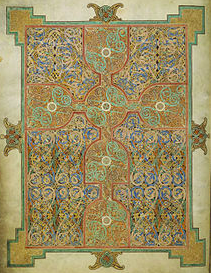
One of several “carpet pages” from the
Lindisfarne Gospels, depicting a cross
in the ornate Anglo-Celtic style.
And they sought to lay hold on him, but feared the people: for they knew that he had spoken the parable against them: and they left him, and went their way. And they send unto him certain of the Pharisees and of the Herodians, to catch him in his words. And when they were come, they say unto him, “Master, we know that thou art true, and carest for no man: for thou regardest not the person of men, but teachest the way of God in truth: Is it lawful to give tribute to Caesar, or not? Shall we give, or shall we not give?”
But he, knowing their hypocrisy, said unto them, “Why tempt ye me? bring me a penny, that I may see it.” And they brought it. And he saith unto them, “Whose is this image and superscription?” And they said unto him, “Caesar’s.” And Jesus answering said unto them, “Render to Caesar the things that are Caesar’s, and to God the things that are God’s.” And they marveled at him.
Then come unto him the Sadducees, which say there is no resurrection; and they asked him, saying, “Master, Moses wrote unto us, If a man’s brother die, and leave his wife behind him, and leave no children, that his brother should take his wife, and raise up seed unto his brother. Now there were seven brethren: and the first took a wife, and dying left no seed. And the second took her, and died, neither left he any seed: and the third likewise. And the seven had her, and left no seed: last of all the woman died also. In the resurrection therefore, when they shall rise, whose wife shall she be of them? for the seven had her to wife.”
And Jesus answering said unto them, “Do ye not therefore err, because ye know not the scriptures, neither the power of God? For when they shall rise from the dead, they neither marry, nor are given in marriage; but are as the angels which are in heaven. And as touching the dead, that they rise: have ye not read in the book of Moses, how in the bush God spake unto him, saying, ‘I am the God of Abraham, and the God of Isaac, and the God of Jacob’? He is not the God of the dead, but the God of the living: ye therefore do greatly err.”
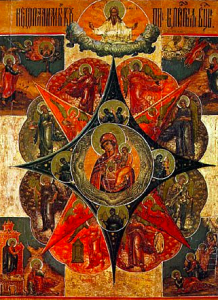
Russian ikon of Our Lady
of the Burning Bush.
And one of the scribes came, and having heard them reasoning together, and perceiving that he had answered them well, asked him, “Which is the first commandment of all?” And Jesus answered him, “The first of all the commandments is, ‘Hear, O Israel; The Lord our God is one Lord: And thou shalt love the Lord thy God with all thy heart, and with all thy soul, and with all thy mind, and with all thy strength’: this is the first commandment. And the second is like, namely this, ‘Thou shalt love thy neighbor as thyself.’ There is none other commandment greater than these.”
And the scribe said unto him, “Well, Master, thou hast said the truth: for there is one God; and there is none other but he: And to love him with all the heart, and with all the understanding, and with all the soul, and with all the strength, and to love his neighbor as himself, is more than all whole burnt offerings and sacrifices.” And when Jesus saw that he answered discreetly, he said unto him, “Thou art not far from the kingdom of God.” And no man after that durst ask him any question.
And Jesus answered and said, while he taught in the temple, “How say the scribes that Christ is the son of David? For David himself said by the Holy Ghost, ‘The Lord said to my Lord, Sit thou on my right hand, till I make thine enemies thy footstool.’ David therefore himself calleth him Lord; and whence is he then his son?” And the common people heard him gladly. And he said unto them in his doctrine, “Beware of the scribes, which love to go in long clothing, and love salutations in the marketplaces, and the chief seats in the synagogues, and the uppermost rooms at feasts: Which devour widows’ houses, and for a pretense make long prayers: these shall receive greater damnation.”
And Jesus sat over against the treasury, and beheld how the people cast money into the treasury: and many that were rich cast in much. And there came a certain poor widow, and she threw in two mites, which make a farthing. And he called unto him his disciples, and saith unto them, “Verily I say unto you, That this poor widow hath cast more in, than all they which have cast into the treasury: For all they did cast in of their abundance; but she of her want did cast in all that she had, even all her living.”
And as he went out of the temple, one of his disciples saith unto him, “Master, see what manner of stones and what buildings are here!” And Jesus answering said unto him, “Seest thou these great buildings? there shall not be left one stone upon another, that shall not be thrown down.” And as he sat upon the Mount of Olives over against the temple, Peter and James and John and Andrew asked him privately, “Tell us, when shall these things be? and what shall be the sign when all these things shall be fulfilled?”
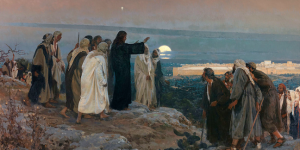
Flevit Super Illam [“He Wept Over It”]
by Enrique Simonet, 1892
(US public domain).
And Jesus answering them began to say, “Take heed lest any man deceive you: For many shall come in my name, saying, ‘I am Christ’; and shall deceive many. And when ye shall hear of wars and rumors of wars, be ye not troubled: for such things must needs be; but the end shall not be yet. For nation shall rise against nation, and kingdom against kingdom: and there shall be earthquakes in diverse places, and there shall be famines and troubles: these are the beginnings of sorrows.
“But take heed to yourselves: for they shall deliver you up to councils; and in the synagogues ye shall be beaten: and ye shall be brought before rulers and kings for my sake, for a testimony against them. And the gospel must first be published among all nations. But when they shall lead you, and deliver you up, take no thought beforehand what ye shall speak, neither do ye premeditate: but whatsoever shall be given you in that hour, that speak ye: for it is not ye that speak, but the Holy Ghost. Now the brother shall betray the brother to death, and the father the son; and children shall rise up against their parents, and shall cause them to be put to death. And ye shall be hated of all men for my name’s sake: but he that shall endure unto the end, the same shall be saved.
“But when ye shall see the abomination of desolation, spoken of by Daniel the prophet, standing where it ought not,” (let him that readeth understand,) “then let them that be in Judæa flee to the mountains: And let him that is on the housetop not go down into the house, neither enter therein, to take any thing out of his house: And let him that is in the field not turn back again for to take up his garment. But woe to them that are with child, and to them that give suck in those days! And pray ye that your flight be not in the winter. For in those days shall be affliction, such as was not from the beginning of the creation which God created unto this time, neither shall be. And except that the Lord had shortened those days, no flesh should be saved: but for the elect’s sake, whom he hath chosen, he hath shortened the days. And then if any man shall say to you, ‘Lo, here is Christ’; or, ‘lo, he is there’; believe him not: For false Christs and false prophets shall rise, and shall shew signs and wonders, to seduce, if it were possible, even the elect. But take ye heed: behold, I have foretold you all things.
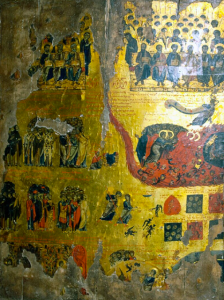
Georgian ikon of the Last Judgment, written
ca. 1100, kept at St. Catherine’s Monastery
on Mount Sinai.
“But in those days, after that tribulation, the sun shall be darkened, and the moon shall not give her light, and the stars of heaven shall fall, and the powers that are in heaven shall be shaken. And then shall they see the Son of Man coming in the clouds with great power and glory. And then shall he send his angels, and shall gather together his elect from the four winds, from the uttermost part of the earth to the uttermost part of heaven. Now learn a parable of the fig tree; when her branch is yet tender, and putteth forth leaves, ye know that summer is near: So ye in like manner, when ye shall see these things come to pass, know that it is nigh, even at the doors. Verily I say unto you, that this generation shall not pass, till all these things be done. Heaven and earth shall pass away: but my words shall not pass away.
“But of that day and that hour knoweth no man, no, not the angels which are in heaven, neither the Son, but the Father. Take ye heed, watch and pray: for ye know not when the time is. For the Son of Man is as a man taking a far journey, who left his house, and gave authority to his servants, and to every man his work, and commanded the porter to watch. Watch ye therefore: for ye know not when the master of the house cometh, at even, or at midnight, or at the cockcrowing, or in the morning: Lest coming suddenly he find you sleeping. And what I say unto you I say unto all, ‘Watch.'”
Details peculiar to Mark include: that Jesus, after adducing the fig tree’s lesson that anything asked in faith will be given, reiterates that his disciples must forgive those who have sinned against them and pray for their pardon whenever they pray; that, in answering the sincere scribe, he opens with the Shema rather than the bare commandment; that the Olivet Discourse was given specifically in answer to the two sets of brothers, SS. Peter and Andrew and SS. James and John; and that “neither the Son, but the Father” alone knows when the Son of Man will return.
Spy Wednesday
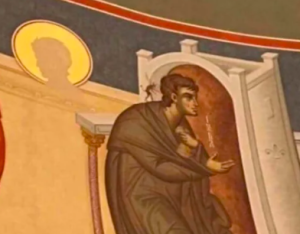
Judas Iscariot leaving the Last Supper.
Mark 14.1-11 (?); cf. Matthew 26.3-16, Luke 22.1-6, John 11.47-12.11
Named for the betrayal of Judas Iscariot.
After two days was the feast of the Passover, and of unleavened bread: and the chief priests and the scribes sought how they might take him by craft, and put him to death. But they said, “Not on the feast day, lest there be an uproar of the people.”
And being in Bethany in the house of Simon the leper, as he sat at meat, there came a woman having an alabaster box of ointment of spikenard very precious; and she brake the box, and poured it on his head. And there were some that had indignation within themselves, and said, “Why was this waste of the ointment made? For it might have been sold for more than three hundred pence, and have been given to the poor.” And they murmured against her.
And Jesus said, “Let her alone; why trouble ye her? she hath wrought a good work on me. For ye have the poor with you always, and whensoever ye will ye may do them good: but me ye have not always. She hath done what she could: she is come aforehand to anoint my body to the burying. Verily I say unto you, Wheresoever this gospel shall be preached throughout the whole world, this also that she hath done shall be spoken of for a memorial of her.”
And Judas Iscariot, one of the twelve, went unto the chief priests, to betray him unto them. And when they heard it, they were glad, and promised to give him money. And he sought how he might conveniently betray him.
Details peculiar to Mark are minimal here.
MAUNDY THURSDAY
Mark 14.12-14.68 (?); cf. Matthew 26.17-70, Luke 22.7-71, John 13.1-18.24
Named for the washing of the disciples’ feet, called the “maundy” from mandatum novum, “new commandment.”
And the first day of unleavened bread, when they killed the Passover, his disciples said unto him, “Where wilt thou that we go and prepare that thou mayest eat the Passover?” And he sendeth forth two of his disciples, and saith unto them, “Go ye into the city, and there shall meet you a man bearing a pitcher of water: follow him. And wheresoever he shall go in, say ye to the goodman of the house, ‘The Master saith, “Where is the guest-chamber, where I shall eat the Passover with my disciples?”‘ And he will shew you a large upper room furnished and prepared: there make ready for us.” And his disciples went forth, and came into the city, and found as he had said unto them: and they made ready the Passover.
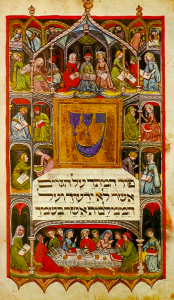
Frontispiece of an illuminated Haggadah
(Passover Seder liturgy), copied ca. 1430
by Israel ben Meir of Heidelberg.
And in the evening he cometh with the twelve. And as they sat and did eat, Jesus said, “Verily I say unto you, One of you which eateth with me shall betray me.” And they began to be sorrowful, and to say unto him one by one, “Is it I?” and another said, “Is it I?” And he answered and said unto them, “It is one of the twelve, that dippeth with me in the dish. The Son of man indeed goeth, as it is written of him: but woe to that man by whom the Son of man is betrayed! good were it for that man if he had never been born.”
And as they did eat, Jesus took bread, and blessed, and brake it, and gave to them, and said, “Take, eat: this is my body.” And he took the cup, and when he had given thanks, he gave it to them: and they all drank of it. And he said unto them, “This is my blood of the new testament, which is shed for many. Verily I say unto you, I will drink no more of the fruit of the vine, until that day that I drink it new in the kingdom of God.” And when they had sung an hymn, they went out into the Mount of Olives.
And Jesus saith unto them, “All ye shall be offended because of me this night: for it is written, I will smite the shepherd, and the sheep shall be scattered. But after that I am risen, I will go before you into Galilee.” But Peter said unto him, “Although all shall be offended, yet will not I.” And Jesus saith unto him, “Verily I say unto thee, That this day, even in this night, before the cock crow twice, thou shalt deny me thrice.” But he spake the more vehemently, “If I should die with thee, I will not deny thee in any wise.” Likewise also said they all.
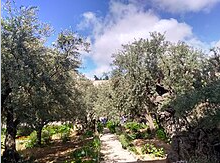
Olive trees in the Garden of Gethsemane,
photographed by Wikimedia contributor
Bernini123 in 2019, used under
a CC BY-SA 4.0 license (source).
And they came to a place which was named Gethsemane: and he saith to his disciples, “Sit ye here, while I shall pray.” And he taketh with him Peter and James and John, and began to be sore amazed, and to be very heavy; and saith unto them, “My soul is exceeding sorrowful unto death: tarry ye here, and watch.” And he went forward a little, and fell on the ground, and prayed that, if it were possible, the hour might pass from him. And he said, “Abba, Father, all things are possible unto thee; take away this cup from me: nevertheless not what I will, but what thou wilt.” And he cometh, and findeth them sleeping, and saith unto Peter, “Simon, sleepest thou? couldest not thou watch one hour? Watch ye and pray, lest ye enter into temptation. The spirit truly is ready, but the flesh is weak.” And again he went away, and prayed, and spake the same words. And when he returned, he found them asleep again, (for their eyes were heavy,) neither wist they what to answer him. And he cometh the third time, and saith unto them, “Sleep on now, and take your rest: it is enough, the hour is come; behold, the Son of Man is betrayed into the hands of sinners. Rise up, let us go; lo, he that betrayeth me is at hand.”
And immediately, while he yet spake, cometh Judas, one of the twelve, and with him a great multitude with swords and staves, from the chief priests and the scribes and the elders. And he that betrayed him had given them a token, saying, “Whomsoever I shall kiss, that same is he; take him, and lead him away safely.” And as soon as he was come, he goeth straightway to him, and saith, “Master, master”; and kissed him. And they laid their hands on him, and took him.
And one of them that stood by drew a sword, and smote a servant of the high priest, and cut off his ear. And Jesus answered and said unto them, “Are ye come out, as against a thief, with swords and with staves to take me? I was daily with you in the temple teaching, and ye took me not: but the scriptures must be fulfilled.” And they all forsook him, and fled. And there followed him a certain young man, having a linen cloth cast about his naked body; and the young men laid hold on him: And he left the linen cloth, and fled from them naked.
And they led Jesus away to the high priest: and with him were assembled all the chief priests and the elders and the scribes. And Peter followed him afar off, even into the palace of the high priest: and he sat with the servants, and warmed himself at the fire.
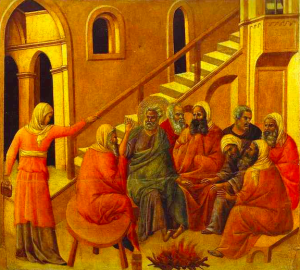
The Denial of Peter by Duccio di
Buoninsegna, 1308-1311.
And the chief priests and all the council sought for witness against Jesus to put him to death; and found none. For many bare false witness against him, but their witness agreed not together. And there arose certain, and bare false witness against him, saying, “We heard him say, I will destroy this temple that is made with hands, and within three days I will build another made without hands.” But neither so did their witness agree together.
And the high priest stood up in the midst, and asked Jesus, saying, “Answerest thou nothing? what is it which these witness against thee?” But he held his peace, and answered nothing. Again the high priest asked him, and said unto him, “Art thou the Christ, the Son of the Blessed?” And Jesus said, “I am: and ye shall see the Son of man sitting on the right hand of power, and coming in the clouds of heaven.” Then the high priest rent his clothes, and saith, “What need we any further witnesses? Ye have heard the blasphemy: what think ye?” And they all condemned him to be guilty of death. And some began to spit on him, and to cover his face, and to buffet him, and to say unto him, “Prophesy”: and the servants did strike him with the palms of their hands.
And as Peter was beneath in the palace, there cometh one of the maids of the high priest: And when she saw Peter warming himself, she looked upon him, and said, “And thou also wast with Jesus of Nazareth.” But he denied, saying, “I know not, neither understand I what thou sayest.” And he went out into the porch; and the cock crew.
Details peculiar to Mark include: seemingly, that Jesus pronounced the cup to be “my blood of the new testament, which is shed for many” after giving it to the disciples; that, at least once during the agony, Jesus reprimands Peter in particular for falling asleep, and that “neither wist they what to answer him” when he upbraids them for falling asleep again (cf. Mark 9.6); that there was “a certain young man” dressed only in a linen cloth present (suggesting that the night was unseasonably hot), and that this young man fled naked; that even the testimony of those witnesses who reported Jesus’ claim to be able to “raise up this sanctuary in three days” was inconsistent, and that at least one of them reported that Jesus said the sanctuary he would raise would be “made without hands”; that the servants of those present for this special session of the Sanhedrin contributed to the mistreatment of Jesus; and that the maid who first accused Peter of being a disciple belonged specifically to the high priest (Caiaphas).
GOOD FRIDAY
Mark 14.69 (?)-15.47; cf. Matthew 26.71-27.61, Luke 23.1-56a, John 18.25-19.42
Named for the reconciliation and victory achieved upon the Cross.
And a maid saw him again, and began to say to them that stood by, “This is one of them.” And he denied it again. And a little after, they that stood by said again to Peter, “Surely thou art one of them: for thou art a Galilaean, and thy speech agreeth thereto.” But he began to curse and to swear, saying, “I know not this man of whom ye speak.” And the second time the cock crew. And Peter called to mind the word that Jesus said unto him, “Before the cock crow twice, thou shalt deny me thrice.” And when he thought thereon, he wept.
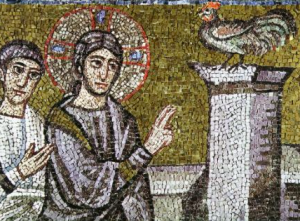
Sixth-century mosaic from the Basilica
of Sant’ Apollinare Nuovo in Ravenna, Italy.
And straightway in the morning the chief priests held a consultation with the elders and scribes and the whole council, and bound Jesus, and carried him away, and delivered him to Pilate. And Pilate asked him, “Art thou the King of the Jews?” And he answering said unto them, “Thou sayest it.” And the chief priests accused him of many things: but he answered nothing. And Pilate asked him again, saying, “Answerest thou nothing? behold how many things they witness against thee.” But Jesus yet answered nothing; so that Pilate marveled.
Now at that feast he released unto them one prisoner, whomsoever they desired. And there was one named Barabbas, which lay bound with them that had made insurrection with him, who had committed murder in the insurrection. And the multitude crying aloud began to desire him to do as he had ever done unto them. But Pilate answered them, saying, “Will ye that I release unto you the King of the Jews?” For he knew that the chief priests had delivered him for envy. But the chief priests moved the people, that he should rather release Barabbas unto them. And Pilate answered and said again unto them, “What will ye then that I shall do unto him whom ye call the King of the Jews?” And they cried out again, “Crucify him.” Then Pilate said unto them, “Why, what evil hath he done?” And they cried out the more exceedingly, “Crucify him.” And so Pilate, willing to content the people, released Barabbas unto them, and delivered Jesus, when he had scourged him, to be crucified.
And the soldiers led him away into the hall, called Praetorium; and they call together the whole band. And they clothed him with purple, and platted a crown of thorns, and put it about his head, and began to salute him, “Hail, King of the Jews!” And they smote him on the head with a reed, and did spit upon him, and bowing their knees worshipped him. And when they had mocked him, they took off the purple from him, and put his own clothes on him, and led him out to crucify him.
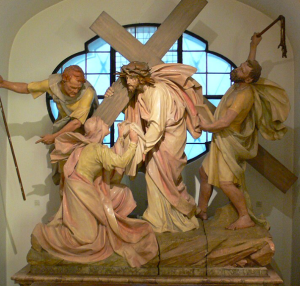
Sixth Station of the Cross from the
Bürgersaalkirche in Munich; photo-
graphed by Andreas Praefcke, 2008,
used under a CC BY 3.0 license (source).
And they compel one Simon a Cyrenian, who passed by, coming out of the country, the father of Alexander and Rufus, to bear his cross. And they bring him unto the place Golgotha, which is, being interpreted, “The place of a skull.” And they gave him to drink wine mingled with myrrh: but he received it not.
And when they had crucified him, they parted his garments, casting lots upon them, what every man should take. And it was the third hour, and they crucified him. And the superscription of his accusation was written over, “The King Of The Jews.” And with him they crucify two thieves; the one on his right hand, and the other on his left. And the scripture was fulfilled, which saith, “And he was numbered with the transgressors.”
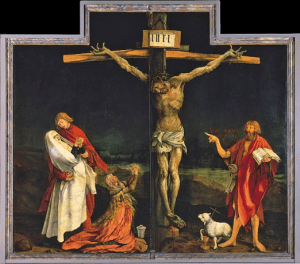
Isenheim Altarpiece by Nikolaus Hagenauer
and Matthias Grünewald, 1512-1516.
And they that passed by railed on him, wagging their heads, and saying, “Ah, thou that destroyest the temple, and buildest it in three days, Save thyself, and come down from the cross.” Likewise also the chief priests mocking said among themselves with the scribes, “He saved others; himself he cannot save. Let Christ the King of Israel descend now from the cross, that we may see and believe.” And they that were crucified with him reviled him.
And when the sixth hour was come, there was darkness over the whole land until the ninth hour. And at the ninth hour Jesus cried with a loud voice, saying, “Eloi, Eloi, lama sabachthani?” which is, being interpreted, “My God, my God, why hast thou forsaken me?”
And some of them that stood by, when they heard it, said, “Behold, he calleth Elias.” And one ran and filled a spunge full of vinegar, and put it on a reed, and gave him to drink, saying, “Let alone; let us see whether Elias will come to take him down.” And Jesus cried with a loud voice, and gave up the ghost. And the veil of the temple was rent in twain from the top to the bottom. And when the centurion, which stood over against him, saw that he so cried out, and gave up the ghost, he said, “Truly this man was the Son of God.”
There were also women looking on afar off: among whom was Mary Magdalene, and Mary the mother of James the less and of Joses, and Salome; (who also, when he was in Galilee, followed him, and ministered unto him;) and many other women which came up with him unto Jerusalem.
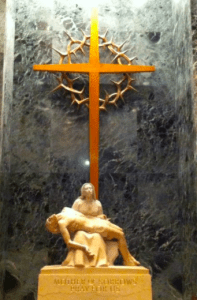
Chapel of Our Lady of Sorrows, Basilica
of the Immaculate Conception,
Washington DC.
And now when the even was come, because it was the preparation, that is, the day before the sabbath, Joseph of Arimathaea, an honorable counselor, which also waited for the kingdom of God, came, and went in boldly unto Pilate, and craved the body of Jesus. And Pilate marveled if he were already dead: and calling unto him the centurion, he asked him whether he had been any while dead. And when he knew it of the centurion, he gave the body to Joseph. And he bought fine linen, and took him down, and wrapped him in the linen, and laid him in a sepulcher which was hewn out of a rock, and rolled a stone unto the door of the sepulcher. And Mary Magdalene and Mary the mother of Joses beheld where he was laid.
Details peculiar to Mark include: that Simon of Cyrene was “the father of Alexander and Rufus,” the latter possibly being the Rufus mentioned in Romans 16.13; that the “gall” of Matthew 27.34 (gall could mean many mixtures of bitter herbs, resins, etc.—cf. the Passover maror—that acted as a painkiller) was specifically myrrh; that the Crucifixion fulfilled the prophecy of Isaiah 53; and that Pontius Pilate was surprised to learn that Jesus was already dead.
HOLY SATURDAY
—; cf. Matthew 27.62-66, Luke 23.56b, —
Named thus as the Saturday of Holy Week, or possibly for the saints resurrected on this day (Matt. 27.52-53).
Also called “Easter Eve” or Easter Even,” or “the Great Sabbath” in Eastern Churches.
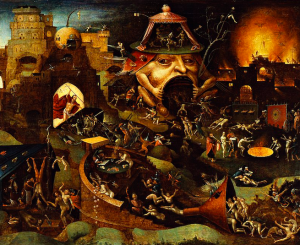
Christ in Limbo, by a disciple of
Hieronymus Bosch, 1575.
There are, necessarily, no details peculiar to Mark about Holy Saturday.
EASTER SUNDAY
Mark 16.1-8; cf. Matthew 28.1-15, Luke 24.1-49, John 20.1-23
Named after the Anglo-Saxon deity Ēostre, goddess of spring and dawn (cf. the Greek Ēōs [Ἠώς]).
And when the sabbath was past, Mary Magdalene, and Mary the mother of James, and Salome, had bought sweet spices, that they might come and anoint him. And very early in the morning the first day of the week, they came unto the sepulcher at the rising of the sun. And they said among themselves, “Who shall roll us away the stone from the door of the sepulcher?” And when they looked, they saw that the stone was rolled away: for it was very great.
And entering into the sepulcher, they saw a young man sitting on the right side, clothed in a long white garment; and they were affrighted. And he saith unto them, “Be not affrighted: Ye seek Jesus of Nazareth, which was crucified: he is risen; he is not here: behold the place where they laid him. But go your way, tell his disciples and Peter that he goeth before you into Galilee: there shall ye see him, as he said unto you.”
And they went out quickly, and fled from the sepulcher; for they trembled and were amazed: neither said they any thing to any man; for they were afraid.
Details peculiar to Mark include: that the women who went to tend Jesus’ body (known in the East as “the myrrh-bearers”) were unsure how they would get into the tomb to perform their task; that the angel inside the tomb not only directs the myrrh-bearers to tell the disciples, but singles out St. Peter by name; and that the women were too frightened to say anything—presumably only at first (since if they had remained silent permanently, we would know nothing about this encounter).*
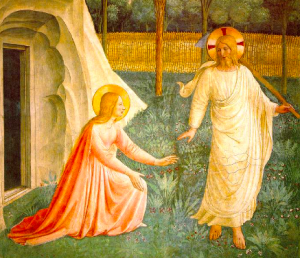
Noli Me Tangere [“Touch Me Not”], fresco
by Fra Angelico, ca. 1440, depicting St. Mary
Magdalene’s encounter with the resurrected
Christ (detailed in John 20.11-18).
*There are discrepancies among the accounts of the Resurrection. In particular: Matthew 28 mentions two women (St. Mary Magdalene and “the other Mary”); Mark 16, the above three; Luke 24, an undefined number of women; and John 20, only the Magdalene herself. These discrepancies are certainly a puzzle. Further, they are often touted as contradictions, and by extension as evidence against the veracity of the Gospels.
Now, if a group of people experienced something as dramatic as their beloved messiah coming back from the dead, it might be understandable if they had trouble recollecting the details with perfect accuracy! (Moreover, I am far from the first person to point out that what would be really fishy would be word-perfect agreement—and considering how much of the Gospels show exactly that kind of unison, it’s striking that even the Synoptics haven’t got the smallest touch of it here.) But in any case, I personally don’t think a real contradiction must underlie these discrepancies. The following schema seems to me as if it accounts for all the details, and hints at how they might have got jumbled:
- Jesus is raised from the dead, leaves the tomb, and departs from the vicinity (there is a tradition that his first act after the Resurrection was to go to his Mother and greet her—it is striking that she is never named among the myrrh-bearers in any Gospel); whether to let him out, the disciples in, or both, an angel stuns the guards and rolls the stone away from the mouth of the tomb. [Matt. 28.2-4]
- The myrrh-bearers—at minimum, the quartet of St. Mary Magdalene, Mary the mother of James (possibly “Mary the wife of Cleophas” and/or “the mother of Zebedee’s sons”), Joanna (cf. Luke 8.3), and Salome (cf. Mark 15.40-41)—come to the tomb to tend Jesus’ body. [Matt. 28.1, Mark 16.1-3, Luke 24.1, John 20.1a]
- The myrrh-bearers notice that the tomb is open and empty; St. Mary Magdalene immediately runs to tell the Eleven about the (apparent) disaster. [Mark 16.4, Luke 24.2, John 20.1b]
- Mary Cleophas and Salome enter the tomb, speak with the angel, are told to spread the word, and depart. [Matt. 28.5-8, Mark 16.5-8a, Luke 24.3-8]
- The Magdalene reaches the Eleven with her message; most of them think she is in hysterics, but SS. Peter and John run for the tomb, the Magdalene coming behind them more slowly. [Luke 24.9-12a, John 20.2-4]
- Jesus makes his way back to the tomb, meeting Mary Cleophas and Salome briefly. [Matt. 28.9-10]
- On their way, Peter and John cross paths with (or at least come within hailing distance of) Mary Cleophas and Salome; being in shock, the women say nothing to them at the time. [Mark 16.8b]
- Peter and John reach the tomb, investigate, and leave. [Luke 24.12b, John 20.5-10]
- Mary Magdalene gets back to the tomb in a brief “lull,” while everyone but the angel is gone. [John 20.11-13]
- Jesus arrives back at the tomb immediately after her and speaks with her. [John 20.14-17]


